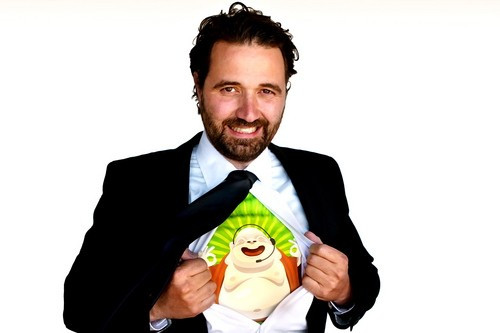The Automated Future: Humans Need Not Apply
We speak to ZenDesk co-founder and CEO Mikkel Svane about the automated future and the importance of customer service to businesses.

In the world we live in, speaking to another human being is becoming an increasingly rare event. It is very easy to go through a working day without ever speaking face-to-face with another person.
From buying tickets at the automated machines on the Tube, and sending emails to the person sitting four desks away in your office and using the self-service checkout tills in the supermarket, it seems as if avoiding speaking to another human has become a priority for many of us.
While some will bemoan this move away from real human interaction, Mikkel Svane is not among them.
Svane is the founder and CEO of ZenDesk, cloud-based customer service softwre which aims to simplify and streamline how businesses interact with customers, their orders and problems.
Svane therefore is ideally placed to comment on what the future holds for the human race when it comes to what they want from customer service. And he is firmly in the camp of the automated assistant.
To illustrate his point, Svane tells IBTimes UK contrasting stories about purchasing cars, highlighting how the old system simply doesn't work anymore.
Tesla
When pre-orders for the Tesla Model S began in March 2009 Svane was number 319 in line, pre-ordering the car online and paying his deposit, without having to speak to a single salesman. A couple of years later he received an email saying his car was ready, and someone drove his new electric car to his front door and handed him the keys.
"[Buying the Model S] was a completely automated process and I just felt great about it," Svane says.
Svane then talked about buying a Mini for his wife this year when he "had to talk to I don't know how many people." At each stage sales people tried to "upsell" adding extras like insurance and in total it was a four-step process.
Even after the car had been purchased, the salesman kept contacting Svane, asking : "Are you happy with your purchase? Remember to rate me high on your satisfaction rating."
It is clear to see from watching Svane talk about the two experiences that Tesla's approach is the one he admires; the one he believes is the model for the future of customer service.
It works
"I think that what really matters is the stuff that works, if we can build that as a self-service experience we all want that. It works, it's smooth, it is super-easy."
But, before you begin imagining Hal, SkyNet or one of hundreds of other science fiction scenarios where the robots take control, Svane believes that behind all this automation needs to be a real human being.
"The moment the self-service breaks, and we all know that can happen, we need to be able to reach out to someone personally.
"Optimise for the self-service experience as much as possible but as soon as it breaks make sure you have someone who can intervene and really deal on a personal level with the customer."
The problem at the moment is that a lot of automated services, such as those used by everyone from banks to car rental companies, are terrible. Mired in dense menu and sub-menu systems, they are simply unable to comprehend natural language.

However research in this area is developing fast, with voice recognition experts Nuance recently showing off NINA (Nuance Interactive Natural Assistant) which can understand natural language speech and process multiple piece of information at once.
Natural fit
Technology like this would seem like a natural fit for ZenDesk, and Svane admits it is something his company is looking into:
"I think there is a lot of interesting things happening, both in terms of voice recognition and in terms of sentiment analysis. It is definitely an area where we are having [research and development] activities."
However this is not going to happen overnight: "Productising all of that is not still something that is just around the corner."
Svane believes that Google and Apple's endeavours in this area are really helping to commoditise and democratise it, and he predicts Apple will release a Siri API in the next couple of years, allowing third-party app developers to integrate Siri's voice recognition abilities into their own apps.
But improved technology on its own is not enough, businesses also have to change the way they view their customers.
Relationships
Since setting ZenDesk up with his co-founders Alexander Aghassipour, and Morten Primdahl in a small loft in Copenhagen in 2007 Svane believes that companies' relationships with their customers have changed dramatically and therefore customer service has had to change.
He believes companies have a "whole new perspective on [their] customers and how crucial long-term customers are for business. It is no longer about the individual transaction, that's not relevant anymore.
"What is interesting is the relationship between a company and a consumer is [now] a lifetime relationship, where all these small transactions between the consumer and the company defines the value of the customer relationship."
What Svane is saying is that a customer is more valuable to a company than simply the sum of the transactions between the two, and a lot of this is down to the rise of social media. "Customers have a big voice thanks to the internet, blogs, Facebook and Twitter, which changes how companies manage customer relationships."
What this means for companies looking to make the most of these relationships, is having to be constantly at their customer's beck and call:
"24/7 always on, anywhere [customer service], that is the new reality" for companies that are customer-focused.
Growth
In the last six years the company has seen huge growth and now has over 150,000 customers in over 140 countries including high-profile companies like Disney and Groupon. Its customers range in size from companies with thousands of support staff to single-person businesses selling bikes in South Korea.
In the UK the company currently has around 2,500 customers including Gov.uk, and the company recently opened a data centre in Dublin, its first in the European Union. Svane says this helps when winning over customers who are worried about their data.
"Speaking to governments and large organisations, there are a lot of considerations regarding privacy laws and jurisdictions," Svane says. While the current US-EU Safe Harbor agreement means ZenDesk doesn't have to store its customers' data within the EU, setting up a data centre here takes a lot of people's concerns "off the table."
Regulation of data in the cloud on a global scale is an issue which needs to be addressed but it is not for companies like ZenDesk to drive the regulation forward:
"There are so many things that need to be regulated on a global scale. Companies like us can help push that, but we are not driving it."
Security
Another big issue for customers signing up for ZenDesk's software is security, and like every other major company in the world, ZenDesk has been the target of cyber-criminals.
In February the company admitted that it had been hacked with information from three of its high profile customers being compromised - Twitter, Pinterest and Tumblr. While ZenDesk was upfront about what happened, Svane says you need to be careful not to spook people:
"We need to be transparent as a company with our customers. There is a very fine balance between being transparent and sometimes spreading fear. We have to be very careful with our communication around this thing. Show that we are completely on top of these things," Svane says.
He adds that no matter how much resources you put into security, if someone has the time and resources to plan an attack then they will get in - be that a bank or a data centre.
"Hacking incidents will be very hard to avoid. But being able to really control and manage them, know exactly what happened, and to the widest possible extent not making it easy [is important]."
© Copyright IBTimes 2025. All rights reserved.






















